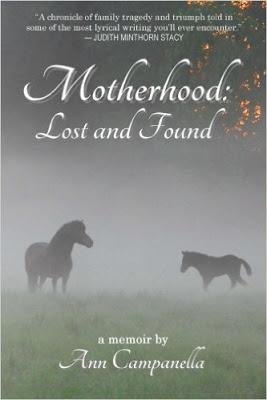
Published December 4, 2013.
Ann Campanella experienced a decade of tension about her mother's failing health and her difficulties carrying a baby full term, which she chronicles in her memoir, Motherhood: Lost and Found (2013).As an award-winning poet, Campanella brings her creative abilities of insight and turn of phrase to her work.
She generously shares her tender feelings and insights about her mother and her pregnancies, which may serve as a great comfort to people facing one or both of these challenges.
At the start of her book, we watch as Campanella's mother grows increasingly distracted and emotional.
Her mother, Elizabeth (Betsy) Williams, has trouble driving, keeping track of time, and remembering what city she's in. She even fails to recognize family members and grows more dependent on others to help her dress, eat, and use the bathroom.
But the changes to memory and bodily function are not the only symptoms of Alzheimer's Disease. Betsy grows more emotional, alternating between being confused, angry, depressed, paranoid, and hurt.
In time, the doctor's describe Betsy's symptoms as those consistent with Alzheimer's Disease. While this does give the family some answers, a diagnosis of a disease with no cure doesn't remove the affiliated difficulties.
Her family rallies around her and provides a great deal of physical and emotional support. Nevertheless, the family members also struggle with physical and emotional exhaustion at times.
While working to support her mother and support her feelings about the corresponding change to their mother-daughter connection, Campanella also experiences several miscarriages. Each one has its own shape of loss. As Campanella grows closer and closer to her fortieth birthday, she wonders if she and her frequently traveling husband Joel will ever have a child.
Campanella finds refuge in the care of her horse, Crimson. The passages about Crimson contain the most calm, grounded and peaceful moments in the memoir. Caring for her horse is quite therapeutic for Campanella.
While I don't want to spoil the ending, I will tell you that the events of the last thirty pages dovetail in miraculous and beautiful ways. These pages encapsulate the bittersweet tragedies and triumphs of the human condition with the cycles of life all converging, sometimes within mere hours of each other.
I was honored to serve as a witness to Campanella's tenderly told story.
Related:
Books about Dementia Films about Dementia

